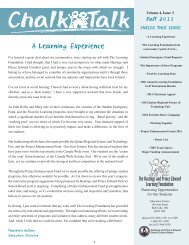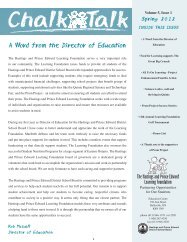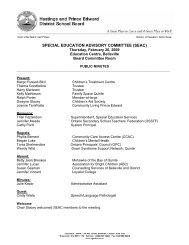Grade 11 Healthy Active Living Education Additional Supports ...
Grade 11 Healthy Active Living Education Additional Supports ...
Grade 11 Healthy Active Living Education Additional Supports ...
You also want an ePaper? Increase the reach of your titles
YUMPU automatically turns print PDFs into web optimized ePapers that Google loves.
Teacher Resource (conÕt)<br />
Mental Health Disorder Research Information Ð Anxiety Disorders<br />
Specific Disorder: Phobias<br />
General Description:<br />
Phobias are a common form of anxiety. Phobias are characterized by persistent fear of<br />
objects, activities or situations, which interfere with the personÕs daily routine, including<br />
school, work and social life. Phobias are significant and persistent fears of objects or<br />
situations. Exposure to the object or situation causes extreme anxiety and interferes with<br />
everyday activities or social life.<br />
Specific phobias have to do with objects or situations Ð for example, germs, dogs or<br />
heights. Social phobias is the fear of being the focus of attention or subject of criticism in<br />
situations or performance situations where embarrassment may occur Ð for example,<br />
public speaking or dating.<br />
Specific Disorder: Post-Traumatic Stress Disorder<br />
General Description:<br />
Post-traumatic stress disorder is the re-experiencing of a very traumatic event,<br />
accompanied by feelings of extreme anxiety, increased excitability and the desire to<br />
avoid stimuli associated with the trauma. The trauma could be related to such incidents as<br />
military combat, sexual assault, physical attack, robbery, car accident or natural disaster.<br />
Specific Symptoms:<br />
• Persistent avoidance of stimuli associated with the trauma<br />
• Re-Experiencing of the event<br />
Specific Disorder: Panic Disorder (Panic Attacks)<br />
General Description:<br />
Panic Disorders is characterized by recurrent, unexpected panic attacks, followed by<br />
persistent concern about having further panic attacks, worry about the possible<br />
implications or consequences of the attacks or a significant behavioral change related to<br />
the attacks.<br />
Specific Symptoms:<br />
• Derealization (feelings of unreality)<br />
• Fear of dying<br />
• Numbing or tingling sensation<br />
• Fear of losing control/going crazy<br />
Specific Disorder: Obsessive-Compulsive Disorder<br />
General Description:<br />
Obsessive-compulsive disorder is marked by repeated obsessions and/or compulsions that<br />
are so severe that they interfere with everyday activities. Obsessions are disturbing,<br />
intrusive thoughts, ideas, or images that cause marked anxiety or distress. Compulsions<br />
are repeated behaviours or mental acts intended to reduce anxiety.<br />
<strong>Grade</strong> <strong>11</strong> <strong>Healthy</strong> <strong>Active</strong> <strong>Living</strong> <strong>Education</strong> (PPL30), Module #2 Positive Mental Health and Stress<br />
Page 70
















